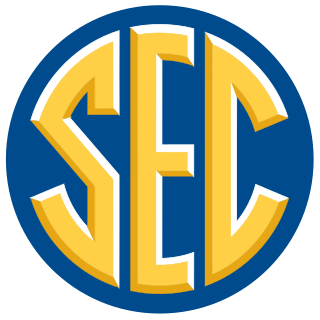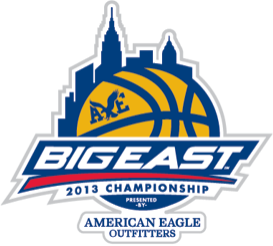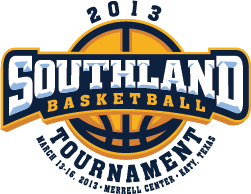There are a number of formats used in various levels of competition in sports and games to determine an overall champion. Some of the most common are the single elimination, the best-of- series, the total points series more commonly known as on aggregate, and the round-robin tournament.
A wild card is a tournament or playoff berth awarded to an individual or team that fails to qualify in the normal way; for example, by having a high ranking or winning a qualifying stage. In some events, wildcards are chosen freely by the organizers. Other events have fixed rules. Some North American professional sports leagues compare the records of teams which did not qualify directly by winning a division or conference.
The Mid-American Conference men's basketball tournament is an NCAA Division I postseason single-elimination tournament. The winner of the tournament receives the Mid-American Conference (MAC) automatic bid to the NCAA Men's Division I Basketball Championship. As of 2021, the top eight teams in conference play qualify for the tournament. Since 2000, the MAC Tournament has been held at Rocket Mortgage FieldHouse in Cleveland and is planned to be held there through at least 2030. The finals are broadcast on ESPN2 while the semifinals on CBS Sports Network & the quarterfinals are on ESPN+ for streaming.
The MAAC men's basketball tournament is the conference championship tournament in basketball for the Metro Atlantic Athletic Conference (MAAC). The tournament has been held every year since 1982, the MAAC's first season. It is a single-elimination tournament and seeding is based on regular season records. The winner, declared conference champion, receives the conference's automatic bid to the NCAA men's basketball tournament. The MAAC did not receive its automatic bid from the NCAA until 1984.
The West Coast Conference men's basketball tournament is the annual concluding tournament for the NCAA college basketball in the West Coast Conference (WCC). The winner of the tournament each year is guaranteed a place in the NCAA Division I men's basketball tournament for that season. Through 2008, the tournament was played on a rotating basis at the home courts of member teams. The 2009 edition was the first played at a neutral site, namely Orleans Arena in Paradise, Nevada, just outside Las Vegas. The semifinals are broadcast nationally on ESPN2 and the championship is broadcast nationally on ESPN.

The SEC men's basketball tournament is the conference tournament in basketball for the Southeastern Conference (SEC). It is a single-elimination tournament that involves all league schools. Its seeding is based on regular season records. The winner receives the conference's automatic bid to the NCAA men's basketball tournament; however, the official conference championship is awarded to the team or teams with the best regular season record.
The National Basketball Association (NBA) playoffs is the annual elimination tournament held to determine the league champion. The four-round, best-of-seven tournament is held after the league's regular season and its preliminary postseason tournament, the NBA play-in tournament. Six teams from each of the two conferences automatically advance to the playoffs based on regular season winning percentage, while those teams finishing 7 through 10 from each conference compete in the play-in tournament to determine the final two playoff seeds.
The 2009 Big East men's basketball tournament, a part of the 2008–09 NCAA Division I men's basketball season, took place in March 2009 at Madison Square Garden in New York City. The Louisville Cardinals defeated the Syracuse Orange 76–66 in the tournament finals to earn the Big East tournament championship for the first time, and received the Big East Conference's automatic bid to the 2009 NCAA tournament.
The Mid-American Conference women's basketball tournament is the postseason single-elimination tournament for the NCAA Division I Mid-American Conference (MAC). The winner of the tournament receives the MAC's automatic bid to the NCAA Division I women's basketball tournament. As of the next MAC tournament in 2021, the top eight teams in conference play will qualify for the tournament.
The 2008–09 Big East Conference men's basketball season was the 30th in conference history, and involved its 16 full-time member schools. Leading up to, during, and following the season, it has been widely regarded as one of the most successful seasons in Big East Conference history, fielding multiple teams that received national recognition and achieved high levels of success.

The 2011 Big East men's basketball tournament, a part of the 2010-11 NCAA Division I men's basketball season, took place from March 8–12, 2011 at Madison Square Garden in New York City. This was the third Big East tournament to include all 16 of the conference's teams. The teams finishing 9 through 16 in the regular season standings played first-round games, while teams 5 through 8 received byes to the second round. The top 4 teams during the regular season received double-byes to the quarterfinals. The tournament was won by Connecticut, their seventh title, tying Georgetown for the most championships in Big East Men's Basketball Tournament history. Connecticut guard Kemba Walker was named the tournament MVP.

The 2013 Big East men's basketball tournament, officially known as the 2013 Big East Championship, was the 34th annual Big East men's basketball tournament, deciding the champion of the 2012–13 Big East Conference men's basketball season. For the 31st consecutive season, the tournament was held at Madison Square Garden in New York City, from March 12–16, 2013. The tournament only featured 14 teams due to Connecticut being given a one-year postseason ban due to APR penalties. This would have been the last year with as many as 16 teams participating in the Big East tournament, but Connecticut was ineligible and West Virginia moved to the Big 12 before the beginning of the season. The conference tournament champion received an automatic bid to the 2013 NCAA tournament.

The 2013 Southland Conference men's basketball tournament, a part of the 2012–13 NCAA Division I men's basketball season, took place March 13–16, 2013 at the Merrell Center in Katy, Texas The winner of the tournament received the Southland Conference's automatic bid to the 2013 NCAA Tournament.
The AHA tournament is the conference tournament for the Atlantic Hockey Association. The winner of the tournament receives an automatic berth into the NCAA Division I men's ice hockey tournament.

The 2014 American Athletic Conference women's basketball tournament was the first annual conference tournament of the American Athletic Conference, one of the two leagues that resulted from the 2013 split of the original Big East Conference. The tournament was held March 7–10, 2014 in the Mohegan Sun Arena in Uncasville, Connecticut and decided the champion of the 2013–14 American Athletic Conference women's basketball season. The 10 conference members competed in a single-elimination tournament for an automatic bid to the 2014 NCAA tournament.

The 2019 American Athletic Conference women's basketball tournament was a postseason tournament held from March 8 through 11, 2019 in the Mohegan Sun Arena in Uncasville, Connecticut. UConn was the winner of the American Athletic Tournament and earned an automatic bid to the 2019 NCAA Division I women's basketball tournament.
The 2019 Big South men's basketball tournament was the postseason men's basketball tournament that ended the 2018–19 season of the Big South Conference. It was held from March 5 through March 10, 2019 at various campus sites. Gardner–Webb defeated Radford 76–65 in the championship game to win the tournament, and received the conference's automatic bid to the NCAA tournament. It was the first title for Gardner–Webb after 11 years in the Big South, and their first trip to the NCAA Tournament in school history.

The 2020 ACC men's basketball tournament presented by New York Life was the postseason men's basketball tournament for the Atlantic Coast Conference and was held at the Greensboro Coliseum in Greensboro, North Carolina, from March 10–11, 2020. It was the 67th annual edition of the tournament.
The 2020 Big South men's basketball tournament was the postseason men's basketball tournament that ended the 2019–20 NCAA Division I men's basketball season of the Big South Conference. It was held from March 3 through March 8, 2020 at various campus sites. The Winthrop Eagles received the automatic bid to the NCAA tournament after defeating Hampton 76–68 in the championship game.
The 2024 Big Ten men's basketball tournament was a postseason men's basketball tournament for the Big Ten Conference of the 2023–24 NCAA Division I men's basketball season which took place from March 13–17, 2024. The tournament was held at the Target Center in Minneapolis, Minnesota. This was the first year in which the first round is broadcast by Peacock. As the tournament winner, Illinois received the conference's automatic bid to the 2024 NCAA Division I men's basketball tournament.








